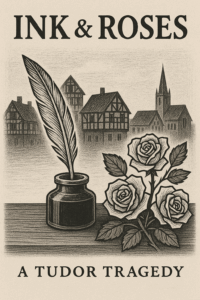(Deptford, 30 April 1592)
The dice sounded like hailstones on a coffin-lid.
Three ivory cubes leapt across the scarred table, struck a puddle of spilled ale, and settled – four, four, one. A groan rippled through the ring of onlookers. Kit let his own sigh arrive half a heartbeat late, polished and theatrical. The man opposite, too drunk to notice, was already fumbling for the coins he no longer possessed.

Kit’s gaze slid past the table, past the guttering tallow, and snagged on a newcomer framed in the doorway.
William Shakespeare, still mud-spattered from the road, stood as though he’d taken a wrong turn and ended up in someone else’s dream. He was clutching the strap of a canvas satchel that bulged with the manuscript of Richard III, the pages curled from sweat and river fog. The satchel was heavy enough to ransom a duke, yet worth nothing until it met a stage.
A slow smile curved Kit’s lips. Here was coin he could borrow without ever reaching for his purse.
He leaned back, letting the dice rest, and studied the Stratford man the way a falcon studies a lark. Shakespeare’s eyes flicked from the bear pit to the dice table, from the knife tucked into Frizer’s belt to the silver hoop glinting in Kit’s ear. Curiosity warred with caution; Kit filed the expression away like a line he might one day gift to a character.
Ingram Frizer’s voice cut through the haze. “Three pounds by Pentecost, Kit. Or the Privy Council hears where you supped last Tuesday.”
Kit answered without looking at him. “Pentecost is still four weeks distant.” He scooped the dice, rolled again. Five, five, six. A cheer; coins scraped toward him like filings to a magnet. Luck, however, was a flirt who never stayed for breakfast. Two throws later, the pile had thinned to a single groat and the echo of his pulse.
Frizer’s hand landed on Kit’s shoulder – heavy, proprietary. “Outside. Air clears debts.”
Kit rose, but not before crooking a finger at Shakespeare. “Walk with me, countryman. I have a proposition that might keep both our purses and our necks intact.”
Will hesitated, then followed. Moonlight silvered the puddles; a distant church bell tolled one. Frizer produced a knife small enough to be polite, large enough to be final. The blade caught the moon and shattered it into shards of light.
“Papers or blood,” Frizer said softly.
Kit felt the Stratford man’s breath hitch beside him. He pitched his voice low, for Will alone. “My new play needs a second hand. Your history has soldiers who speak like men, not marionettes. Help me finish it before Pentecost and we split the profits – enough to buy this dog’s silence and your next pair of boots.”
Before Will could answer, a second figure detached from the shadows: Robert Poley, courier, sometime intelligencer, perennial messenger of bad news. He carried no blade; the parchment in his hand looked sharper than steel.
“Gentlemen,” Poley said, as though they were all about to sit down to supper, “the theatres close tomorrow. Plague orders from the Council. Master Marlowe, you are advised to make yourself scarce.”
Frizer’s eyes glittered. “Scarce men still pay debts.”
Poley smiled with half his mouth. “Scarce men also vanish.” He turned to Kit, then flicked a glance at Will. “Deptford. Tuesday. Eleanor Bull’s house. Bring coin, verse, and – if you wish – your new collaborator.”
The bell tolled twice. Somewhere a bear roared; somewhere else a poet swallowed his own heartbeat. Kit pocketed the knife – not Frizer’s, his own – and stepped back into the torchlight, Will half a pace behind him.
Behind them the dice clattered on, indifferent and bright, counting the hours until Pentecost … and the hours until two poets would decide whether to save each other or sell each other out.
—–
Next Time: A bear-baiting crowd roars. A rehearsal stalls. And Will hears the first whisper that the playhouses are about to close forever. Chapter 4: “The Curtain Falls Silent.”
If you had three shillings and a knife at your throat, would you stake it on poetry, loyalty, or the next roll of the dice? Tell us which – and tag a friend who’d make the same bet.
